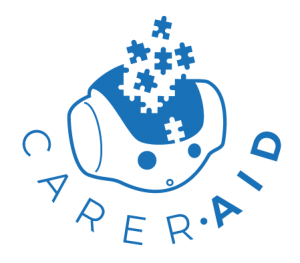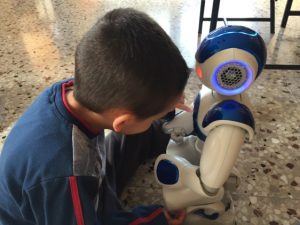This project was supported by the European Union’s H2020 research and innovation program under the Marie Skłodowska Curie Action – Individual Fellowship (CARER-AID) grant agreement no. 703489.
This project envisions a humanoid robot as a supervised autonomous assistant that will support caregivers in early diagnosis and to improve the treatment of individuals with Autism Spectrum Disorder (ASD) associated with Intellectual Disability (ID). The robot can be part of the diagnostic team during the administration of the psycho-diagnostic tests in order to enrich the data that the psychologist can use to refine the diagnosis, helping them to perform early diagnosis and to distinguish among the ASD types and ID levels. Furthermore, the robot can autonomously carry out routine rehabilitation activities, which that don’t need particular attention by the human therapist, also at home. The robot will always remain under the ultimate control of the caregiver who can use the robot’s sensors streaming to monitor the child and intervene when needed.
of the diagnostic team during the administration of the psycho-diagnostic tests in order to enrich the data that the psychologist can use to refine the diagnosis, helping them to perform early diagnosis and to distinguish among the ASD types and ID levels. Furthermore, the robot can autonomously carry out routine rehabilitation activities, which that don’t need particular attention by the human therapist, also at home. The robot will always remain under the ultimate control of the caregiver who can use the robot’s sensors streaming to monitor the child and intervene when needed.
Toward its vision, the research program will introduce three main innovations: (i) an unique set of use cases in which a socially assistive robot gives support to the diagnosis and rehabilitation of ASD and ID; (ii) implementation of novel control strategies for autonomous and safe robot-child interaction that can support the intelligent personalization of activities and overcome problems of the “Wizard of Oz” (WoZ) approach in practical applications; (iii) An user-centred design of the use cases that facilitates the direct integration of the robot in everyday activities and standard therapeutic protocols.
The final output of the research project will be a complete set of use cases that will be implemented and empirically validated via pilot studies and proof-of-concept trials in kindergarten, clinical and family environments. Furthermore, the proposal enlists a series of actions for the widespread scientific dissemination of the experimental results and outreach activities to give evidence also to the general public, especially targeting families with individuals affected by ASD and ID, of the actual opportunities offered by robot and, thus, increase their acceptance and willingness to use robots in the care of children and disabled.
Main publications:
- Di Nuovo, A.; Conti, D.; Trubia, G.; Buono, S.; Di Nuovo, S. (2018). Deep Learning Systems for Estimating Visual Attention in Robot-Assisted Therapy of Children with Autism and Intellectual Disability. ROBOTICS, 7(2): 25.
- Conti, D., Trubia, G., Buono, S., Di Nuovo, S., & Di Nuovo, A. (2018). Evaluation of a robot-assisted therapy for children with autism and intellectual disability. In the Annual Conference Towards Autonomous Robotic Systems (TAROS), pp. 405-415. Springer, Cham.
- Conti D., Di Nuovo S., Buono S., Di Nuovo A. (2017) Robots in education and care of children with developmental disabilities: A study on acceptance by experienced and future professional. INTERNATIONAL JOURNAL OF SOCIAL ROBOTICS, January 2017, Volume 9, Issue 1, pp 51-62.
- Conti D., Di Nuovo S., Trubia G., Buono S., Di Nuovo A. (2015) Use of robotics to stimulate imitation in children with Autism Spectrum Disorder: A pilot study in a clinical setting. Proceedings of the 24th IEEE International Symposium on Robot and Human Interactive Communication (IEEE RO-MAN), pp. 1 -6.
Follow the updates of the project on ResearchGate: https://www.researchgate.net/project/CARER-AID-Controlled-Autonomous-Robot-for-Early-diagnosis-and-Rehabilitation-of-Autism-and-Intellectual-Disability